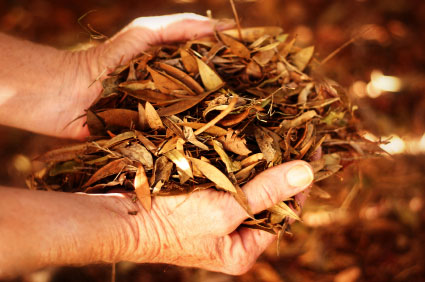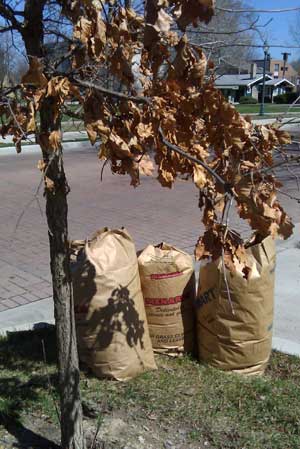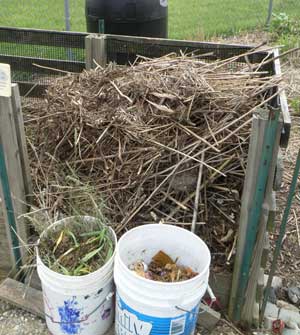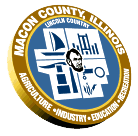Composting & Landscaping
Illinois regulations prohibit landscape waste from being accepted at landfills. Depending on your location and the type of materials, options for managing landscape waste may include the following.
Recycling Landscape Material
Landscape recycling not only eliminates the cost, fuel consumption and carbon emissions of transporting bags and bundles of landscape material but provides nutrient-rich resources for the home landscape. Best practices for recycling landscape waste at home include composting, leaving grass clippings on the lawn, mulching leaves and chipping woody material.
Closing the Landscape Loop
 Many residents are opting out of having their landscape waste hauled off but are instead recycling some, or even all, of their landscape resources at home. Landscape resources, such as trimmings, grass clippings, and fallen leaves, have the potential to provide nutrients to growing plants and increase the soil’s water retention while suppressing weeds and cutting down the need for chemical treatments. Depending on the desired use of your landscape resources, a little more work may be involved, such as starting a composting area, or perhaps, a lot less work such as skipping the task of bagging grass clippings.
Many residents are opting out of having their landscape waste hauled off but are instead recycling some, or even all, of their landscape resources at home. Landscape resources, such as trimmings, grass clippings, and fallen leaves, have the potential to provide nutrients to growing plants and increase the soil’s water retention while suppressing weeds and cutting down the need for chemical treatments. Depending on the desired use of your landscape resources, a little more work may be involved, such as starting a composting area, or perhaps, a lot less work such as skipping the task of bagging grass clippings.
The urban myth that grass clippings cause thatch build-up is not true. Thatch is primarily composed of grass parts that contain slowly decomposing lignin. Lignin is predominantly present in the lower portions of the grass plant, not at the top of the shoot. Grass clippings break down on the lawn within a few days and release nutrients back into the soil. Up to 4 pounds of usable organic nitrogen, a pound of phosphorous and three pounds of potassium are in 100 pounds of grass clippings. In fact, 25% of your lawn’s fertilizer needs can be met by leaving grass clippings on the lawn, reducing the need for supplemental fertilizers.
For a healthy lawn:
- Mow when the grass is dry to allow an even dispersion of discharged grass clippings
- Set your lawnmower deck high to encourage deeper roots and defend against weeds
- Keep the mower blade sharp and consider using a mulching blade
- Limit chemical use to allow beneficial organisms to thrive in the soil
- Apply excesses of chemical-free clippings in a thin layer over your garden and plant beds


 Curbside Pick-up of Landscape Waste
Curbside Pick-up of Landscape Waste Composting accelerates the decomposition of biodegradable materials through a natural heating process, activated by beneficial microbes. The process results in a humus-like product that is applied to garden soil surfaces or used as a soil amendment that:
Composting accelerates the decomposition of biodegradable materials through a natural heating process, activated by beneficial microbes. The process results in a humus-like product that is applied to garden soil surfaces or used as a soil amendment that: